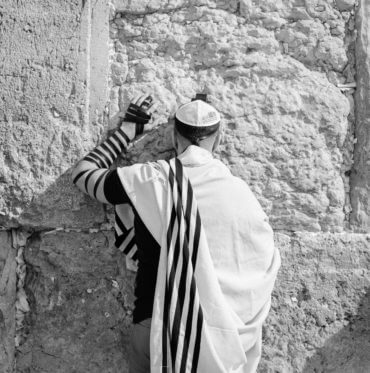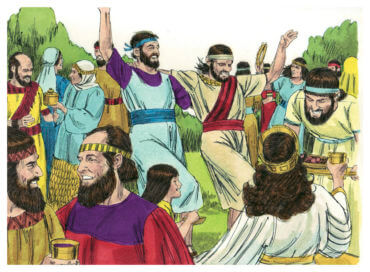The Mothers’ Tears For Their Kidnapped Sons
Praying, observing new mitzvos, attending rallies, sending donations to Israeli soldiers, and calling the White House are some of the actions people around the world are taking in order to help out as we wait for the return of the three Israeli boys (Eyal, Naftali, and Gilad) who were kidnapped last week by terrorists on their way home for Shabbos.
After seeing a picture of the mothers of the three boys hugging and crying yesterday, I was reminded of the most famous Jewish mother known for her tears for her children – Rachel Imeimu/Mama Rochel (Rachel our foremother) – and how Rachel’s tears might give us some insight into one more action we could all perform in order to shake the Heavens and #bringbackourboys.
What are these famous tears of Rachel Imeinu about? As is it says in the book of Jeremiah: “A cry is heard from on high—wailing, bitter weeping—Rachel weeping for her children, she refuses to be comforted for her children, who are gone. Thus said the Lord: Restrain your voice from weeping, your eyes from shedding tears; for there is a reward for your labor—declares the Lord: They shall return from the enemy’s land. And there is hope for your future—declares the Lord: Your children shall return to their country” (Genesis Rabbah 82:10).
Hashem is moved by Rachel’s tears, because of her “labor,” but what exactly did she do that was so special compared to every other righteous person in Jewish history? According to a midrash on the book of Eichah (Lamentations), the prophet Jeremiah is sent by God to meet with some of the greatest (deceased) leaders of the Jewish nation so that they should plead for the Children of Israel who are in exile. One by one, our patriarchs, followed by Moses make their case about why in the merit of their deeds the Jewish people should be saved. First Abraham speaks of his willingness to sacrifice his son Isaac after Hashem commanded him to; then Isaac speaks of his willingness to be sacrificed. Hashem is not moved by either of their stories. Next comes Jacobs who reminds Hashem that on his way out of his father-in-law’s (Lavan) house, Jacob was willing to be killed by Esau in order to save his family. Still not a word from God. Moses comes next. His case seems to be irrefutably strong: he led Hashem’s people from slavery to freedom and tended to them for forty years in the desert as they complained and sinned. Then, after decades of devotion, he wasn’t allowed to step foot in the Promised Land. But even Moses’s plea does not stir the Almighty.
Last but not least, Rachel appears. She reminds Hashem how hard it was for her to not be jealous of her sister, Leah. How she helped Leah marry the love of her life (Jacob) after their deceitful father switched the two sisters under the wedding canopy. How she sacrificed her own happiness to protect her sister’s dignity when no one asked her to. Rachel then asks Hashem the following: “If I, as a flesh and blood mortal, was able to transcend my jealousy and anger, how much more so should You, an immortal King, find compassion for Your people?” The midrash tells us that as soon as she says this Hashem is moved and promises, for her sake, that He will ultimately redeem the Jewish people from their exile.
So what is so special about Rachel’s “labor” versus the accomplishments of all the other tzadikim (righteous men) who plead with God? There are many answers that have been given over the years, but this is my take: Abraham being willing to sacrifice his son, Isaac being willing to get sacrificed, Jacob being willing to die in order to save his family, and Moses leading the Jewish people out of slavery are all larger than life actions that none of us regular people can touch. We will never be called upon to sacrifice our child to God nor will we ever have to lead a nation to freedom. These are all extremely meritorious deeds, but they have little to no bearing on anything any of us can do day to day.
But overcoming our jealousy? Quashing our own egos in the face of someone who’s competing with us? Preserving the dignity of our fellow even if it means not getting to do something we REALLY want to do? Why all those actions are within our reach. They are all doable and achievable, but how many of us are big enough to step up and do them? THOSE are the things that Hashem is waiting for. In fact, we are told that the Almighty decided to build the Beis Hamikdash (the Holy Temple) in the very spot where two brothers who chose to help each other (instead of being jealous of one another) embraced.
Let us each go out and find one person who we are jealous of (or who is jealous of us), put our egos aside, and make peace with him or her. And then when we weep for our children, for our boys to return from the enemy’s land, may we merit for Hashem to return them.
If you found this content meaningful and want to help further our mission through our Keter, Makom, and Tikun branches, please consider becoming a Change Maker today.








1 comment
Sort by
This is beautiful. We can all relate to this. overcoming jealousy and putting our egos aside is one of the hardest things a person can do, but for our boys, we will do anything.
May Hashem answer our prayers